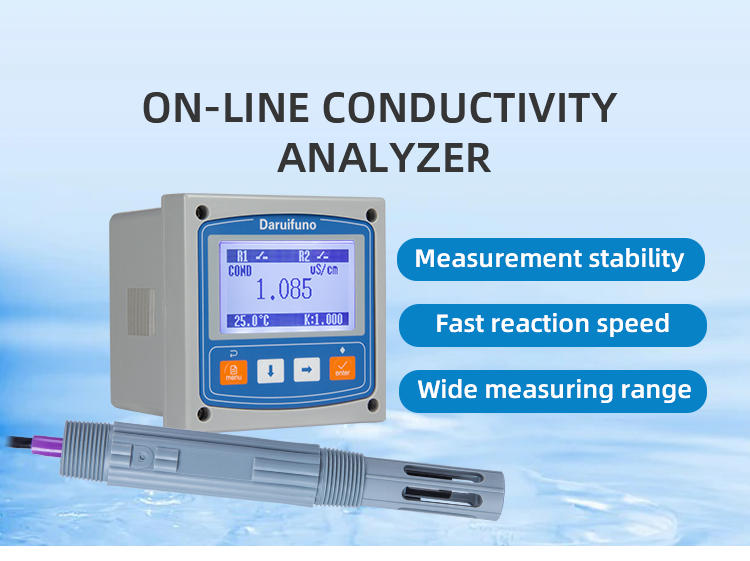
Conductivity Sensor
(Total 7 Products)-
Brand:DaruifunoMin. Order:1 Piece/PiecesModel No:ASCK-0.01Transportation:ExpressPackaging:Cardboard boxesSupply Ability:100 pieces/monthThe acid, alkali, and salt electrolytes dissolved in water dissociate into positive and negative ions in the solution, making the electrolyte solution conductive. The conductivity can be expressed by conductivity. The conductivity of an electrolyte...
-
Brand:daruifunoMin. Order:1 Piece/PiecesModel No:ASCK-0.1Transportation:ExpressPackaging:Cardboard boxesSupply Ability:100 pieces/monthThe five conventional parameters for surface water monitoring are pH, conductivity, dissolved oxygen, turbidity and temperature. These parameters are the basic indicators for water pollution detection. Surface water conductivity is an important...
-
Brand:daruifunoMin. Order:1 Piece/PiecesModel No:ASCK-1Transportation:ExpressSupply Ability:100 pieces/monthConductivity indicates the ability of an aqueous solution to conduct electric current and is often used to indicate the purity of water. The conductivity of pure water is very small. When the water contains inorganic acids, alkalis, salts or organic...
-
Brand:daruifunoMin. Order:1 Piece/PiecesModel No:ASC300NTransportation:Ocean,Land,Air,ExpressPackaging:Cardboard boxesSupply Ability:30 pieces/monthConductivity is an important indicator that reflects the concentration of ions in water and can be used to detect changes in water quality. In the process of domestic sewage treatment, monitoring the conductivity value can help us understand the...
-
Brand:daruifunoMin. Order:1 Piece/PiecesModel No:ASCKTransportation:ExpressPackaging:Cardboard boxesSupply Ability:100 pieces/monthThe ASC series conductivity electrodes developed and produced by Daruifuno are divided into 2-pole conductivity electrodes, 4-pole conductivity electrodes and inductive conductivity electrodes according to the measurement principle. Among them, the...
-
Brand:daruifunoModel No:ASC200Transportation:ExpressPackaging:Cardboard boxesSupply Ability:50 pieces/monthConductivity is a measure of a solution's ability to pass or transmit electrical current. Conductivity sensors are mainly used to monitor the ion concentration in any solution, mainly water quality. Conductivity electrodes are widely used in...
-
Brand:DaruifunoMin. Order:1 Piece/PiecesModel No:ASC200Transportation:ExpressPackaging:Cardboard boxesSupply Ability:50 pieces/monthThe inductive conductivity electrode is a sensor used to measure conductivity. Its working principle is based on the principle of electromagnetic induction. First, the electromagnetic conductivity electrode contains an electrode pair, a transmitting...
Conductivity refers to the degree to which charge carriers (usually ions) in a liquid or solution are capable of conducting electrical current. It is a measure of the conductivity of a liquid and is commonly used to assess the concentration, purity, and ion content of water quality and solutions. Conductivity sensors are specifically designed to measure conductivity. They typically use two electrodes to pass a current through a sample in a liquid and measure the voltage difference between the two electrodes. According to Ohm's law (current equals voltage divided by resistance), the conductivity value can be calculated by measuring the voltage and knowing the electrode spacing.
The measurement principle of Daruifuno's analog Conductivity Sensor is two electrodes, and the materials are stainless steel and graphite.
Stainless steel conductivity sensors use stainless steel as the construction material for electrodes and sensors. Stainless steel has good corrosion resistance and mechanical strength and is suitable for a wide range of application environments. The K constant is divided into 0.01, 0.1 and 1, and the measurement range is 0.05~20uS/cm, 0.5~200uS/cm and 5~2000uS/cm. 1/2 inch NPT mounting thread, suitable for pipeline installation or flow installation. It can usually be used in ultrapure water, pure water, agricultural irrigation and other industries.
Graphite conductivity sensors use graphite materials as electrodes. Graphite has good electrical conductivity and chemical stability, and can be used in specific applications, such as high temperature or strong acid and alkali environment, with a K constant of 1 and a measurement range of 0~10mS/cm. It is usually used in the conductivity detection of surface water, sewage, cooling towers, etc.










